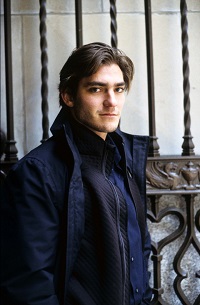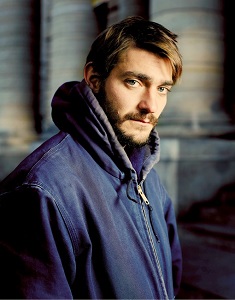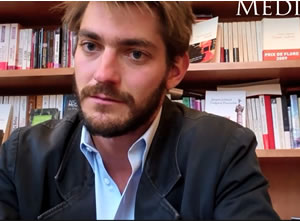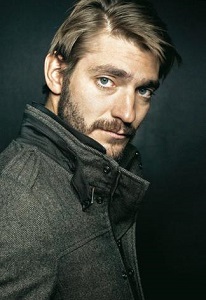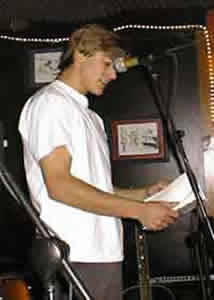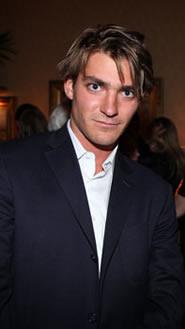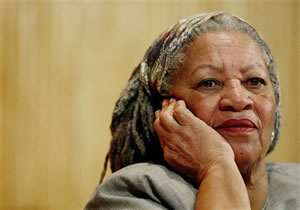De Amerikaanse schrijver Nick McDonell werd geboren op 18 februari 1984 in New York. Zie ook alle tags voor Nick McDonell op dit blog.
Uit: The Bodies in Person
“I didn’t always think this way. I’m an American born in 1984, and halfway through my life my country went to war abroad. For a combination of reasons not unusual among young men. I went too. After the initial bloom of romance around working in places where America was at war, hoping to get shot at without getting shot. I believed the best path was to channel local populations in writing and scrub my voice as much as possible from the pages. I’ve attempted that a few times, tried also to launch projects that move resources faster than words on a screen. But life splinters plans, and ten years into visiting these places and thinking about my own country it’s clear to me that some other kind of reckoning is due. Since autumn of 2001, after nineteen men hijacked and crashed pas-senger jets into skyscrapers in New York, a military headquarters in Washington, D.C., and an open field bordered by conifers in Pennsylva-nia, America has been killing civilians in Afghanistan. For nearly as long, and in earlier wars, it has been killing them in Iraq. No one dis-putes this. The dispute is only over how many, why, and whether the why justifies the killing. Some say America is benevolent, a force for good. Others say it’s a brutal empire. Many observe complexity, and many more are not interested in thinking about these questions at all.
Like prayer, I’ll state here at the beginning that America, Iraq, Afghanistan. and all the others represent incomprehensible multitudes and that the first step away from a person’s name is the first step toward killing him without thinking too much about it. So I want to avoid the general. but I also know it to be pan of our minds, and a nec-essary element of progress. In terms of the specific: Endnotes provide sources and additional context, along with some ideas better separated from the rest of the book—but still important to it, and to me. Through-out, italicized quotations are taken from my notes and memory; direct quotations are taken from scenes and interviews I recorded in person. Some were beautiful, some awful. When I was daunted, I often looked to the natural world for comfort. Especially on beginning trips of uncer-tain outcome.’
T began several trips like that in the tidy city of Erbil. Kurdistan. north-ern Iraq. Erbil’s not at all like the frantic Hollywood movies about the Middle East. The airport is better than John F. Kennedy International. New York’s main airport. The streets are dusty but otherwise clean, people hang out in malls. For a while, most foreign reporters covering the war in Iraq were based in Erbil. I stayed in the Classy Hotel. The name was funny in a way you never had to explain. There was a short pool in the basement in which I swam laps while a vastly obese Iraqi gentleman watched his son bob on inflat-able water wings. The lobby was a popular meeting place for contrac-tors, aid workers, and war profiteers. only a few hours’ drive from the fighting by a good road across the Nineveh Plains. The best-known American newspapers kept correspondents in residence. I stayed on a discount rate, courtesy of a friend, a bureau chief at the time. I was grateful for the discount. Reporting was expensive and the eco-nomics of media were, and remain, uncertain. In fact, as I have been writing this book, the company that paid for it—Penguin Random House.”
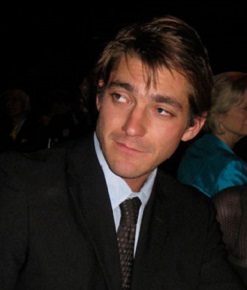
Nick McDonell (New York, 18 februari 1984)
De Nederlandse schrijver Robbert Welagen werd geboren in Dordrecht op 18 februari 1981. Zie ook alle tags voor Robbert Welagen op dit blog.
Uit: Nachtwandeling
“Inspecteur Mudde staat op wanneer het licht wordt. Aan het aanrecht drinkt hij een glas water terwijl hij door het keukenraam uitkijkt over de velden achter zijn huis. De polder, het riet, in de verte koeien. De lente is laat gekomen dit jaar en de koeien staan pas sinds een paar dagen in de wei. Hij loopt naar buiten en snuift in de tuin de ochtendlucht op. Na een kop koffie en het ontbijt stapt Mudde in de auto. Met Jochie – een bruine, acht jaar oude retriever – op de passagiersstoel rijdt hij naar het bos. Alle parkeervakken zijn leeg. Hij stapt uit en maakt het andere portier open, waarna Jochie naar buiten springt en wegrent. Mudde loopt achter hem aan. De zon schijnt door de lichtgroene blaadjes, het roffelen van een specht klinkt van ergens hoog tegen een boomstam en hij heeft zin om een heel eind te gaan wandelen. Hij is nog maar tien minuten op pad als zijn telefoon gaat. Bureau staat er op het schermpje. Hij zucht en neemt op.
‘Ja?’
‘Ook goedemorgen, Mudde,’ zegt de wachtcommandant.
‘Ja ja. Zeg het maar.’
‘We hebben een verdacht overlijden.’
‘Godverde…’
Om hem heen alleen maar bomen en wind, uit de telefoon komen geluiden van het bureau: stemmen, overgaande telefoons, een dichtvallende deur.
‘Die schrijver die gisteravond nog op het nieuws was.’ ‘Welke schrijver?’ zegt Mudde.
‘Je hebt het nieuws niet gevolgd, dat hoor ik al.’
Gisteravond is Mudde naar bed gegaan toen het donker werd. Hij gaat met het lenteritme mee. Als het rustig is op zijn werk kan hij de dagelijkse dingen overlaten aan brigadier Kramer.
‘Kun je Peterse er niet op zetten?’
‘Die is al bezig met die verkrachting.’
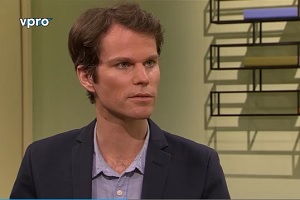
Robbert Welagen (Dordrecht, 18 februari 1981)
De Nederlandse dichter Bart FM Droog werd geboren in Emmen op 18 februari 1966. Zie ook alle tags voor Bart FM Droog op dit blog.
ZOMERTOUR 2000
Rijden tanken rijden
eten rijden tanken
rijden eten slapen
lullen zwemmen slapen
lullen eten zuipen
slapen eten lullen
zwemmen lullen eten
knallen zuipen slapen
eten lullen zwemmen
rijden tanken rijden
tanken eten rijden
tanken rijden zuipen
slapen rijden knallen
rijden eten knallen
zuipen slapen rijden.
INTERCONTINENTAL
Omhoog naar het blauwe
zonovergoten hoge
angels-thirty vrije
hemelse peil
met naast je je engel
en voor je je drank
beneden is Aarde
en weerlicht het wit
met naast je je engel
en voor je de dagen
die waren en zullen
het razen van wielen
op lucht- en snelwegen
ons wachten de dagen
van kicken en knallen
van ontdekken en feesten
wereld, we zijn onderweg.
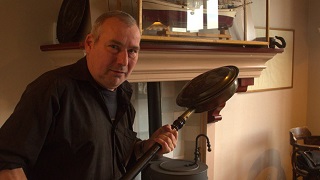
Bart FM Droog (Emmen, 18 februari 1966)
De Nederlandse dichter, publicist en diplomaat Maarten Mourik werd geboren in Streefkerk op 18 februari 1923. Zie ook alle tags voor Maarten Mourik op dit blog.
Jericho
De stage ommegangen van Uw stille kracht
hebben de torens van mijn trots ten val gebracht.
en Uw trompetten voor het heilssignaal gestoken.
hebben de muren van mijn ongeloof doorbroken.
Nu lig ik weerloos voor U open en verwacht
genadige bezetting door Uw liefdemacht.
De vogels
Vanochtend vroeg. het was maar nauwlijks licht –
jij droomde nog. hoe lief was je gezicht
hebben zingende vogels mij gewekt:
je scheemrendd blanke lijf lag ongedekt.
Er floten merels en er koerden duiven.
ik zag de toppen van de bomen wuiven …
Zachtjes heb ik je op je mond gekust
en toen je ontwaakte weer in slaap gesust.
Toen ik veel later opstond was het koor
van vogelstemmen weer verstomd, maar ‘k hoor
vandaag voortdurend nog hun blije zingen:
het legt een glanslicht over alle dingen.
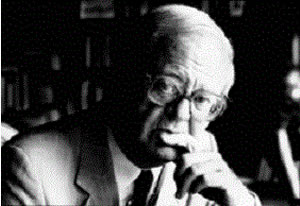
Maarten Mourik (18 februari 1923 – 30 september 2002)
De Nederlandse dichter,vertaler en schilder Huub Beurskens is geboren in Tegelen op 18 februari 1950. Zie ook alle tags voor Huub Beurskens op dit blog.
Kier
De brug heet daar en toen de tweede brug.
Ik ben er gekomen langs het kolenspoor
en klim de helling op. Ik moet terug.
Beneden loopt het beekje vrolijk door.
De brug lijkt niet voor het verkeer gemaakt,
al zie ik er een bord met wit en rood.
Hier is een weg zichzelf ooit kwijtgeraakt:
naar beide zijden loopt het brugdek dood.
Ik stap door borsthoog gras naar het plankier.
Tussen mijn voeten door zie ik de rails.
Een brug verbindt, maar dit hier is een kier.
Een stoomtrein komt voorbij en gilt luidkeels.
Ik sta in wolken rook en stoom gehuld,
bangblij van mijn afwezigheid vervuld.
Twijg
Mijn vader liet mij toen zijn wandelstok.
Hij wist dat niet, mijn moeder gaf hem mij
de avond van zijn dood. Hij liep weer vrij:
de grote houten wijzer van een klok.
Begin april. Ik zie zijn stok daar staan,
al twintig jaren, schuin tegen de muur,
de schoorsteen: eerst nest, nu graf van vuur.
Vlam van bloei en hout van gloed ontdaan.
Het voorjaar wacht in elke knop, geboeid.
Voor woorden heeft de winter zich behoed,
maar zich als sneeuw bewaren kon hij niet.
Begin van brand die uit de botten schiet;
betekenis uit wit, die ik op slag vermoed;
een stok wordt twijg in wat hier gloeit en groeit.
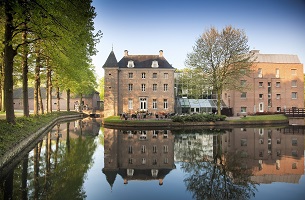
Huub Beurskens (Tegelen, 18 februari 1950)
Château Holtmühle, Tegelen
De Afro-Amerikaansschrijfster Toni Morrison werd geboren op 18 februari 1931 in Lorain, Ohio. Zie ook alle tags voor Toni Morrison op dit blog.
Uit: Jazz
“Sth, I know that woman. She used to live with a flock of birds on Lenox Avenue. Know her husband, too. He fell for an eighteen-year-old girl with one of those deepdown, spooky loves that made him so sad and happy he shot her just to keep the feeling going. When the woman, her name is Violet, went to the funeral to see the girl and to cut her dead face they threw her to the floor and out of the church. She ran, then, through all that snow, and when she got back to her apartment she took the birds from their cages and set them out the windows to freeze or fly, including the parrot that said, “I love you.”
The snow she ran through was so windswept she left no footprints in it, so for a time nobody knew exactly where on Lenox Avenue she lived. But, like me, they knew who she was, who she had to be, because they knew that her husband, Joe Trace, was the one who shot the girl. There was never anyone to prosecute him because nobody actually saw him do it, and the dead girl’s aunt didn’t want to throw money to helpless lawyers or laughing cops when she knew the expense wouldn’t improve anything. Besides, she found out that the man who killed her niece cried all day and for him and for Violet that is as bad as jail.
Regardless of the grief Violet caused, her name was brought up at the January meeting of the Salem Women’s Club as someone needing assistance, but it was voted down because only prayer–not money–could help her now, because she had a more or less able husband (who needed to stop feeling sorry for himself), and because a man and his family on 134th Street had lost everything in a fire. The Club mobilized itself to come to the burnt-out family’s aid and left Violet to figure out on her own what the matter was and how to fix it.
She is awfully skinny, Violet; fifty, but still good looking when she broke up the funeral. You’d think that being thrown out the church would be the end of it–the shame and all–but it wasn’t. Violet is mean enough and good looking enough to think that even without hips or youth she could punish Joe by getting herself a boyfriend and letting him visit in her own house. She thought it would dry his tears up and give her some satisfaction as well. It could have worked, I suppose, but the children of suicides are hard to please and quick to believe no one loves them because they are not really here.”
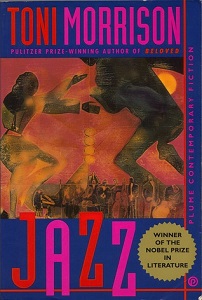
Toni Morrison (Lorain, 18 februari 1931)
Cover
De Duitse dichteres en schrijfster Elke Erb werd geboren op 18 februari 1938 in Scherbach in de Eifel. Zie ook alle tags voor Elke Erb op dit blog.
EIN ZAHMER KONJUNKTIV
Die Straßenbahn kommt nicht Hält nicht Schließt die Tür
bevor du das Trittbrett erreichst.
Etwas ist kompliziert, nicht unkompliziert.
Wäre es unkompliziert, könntest du … Das Herz eine Katze
auf dem Sprung Ereignislos
steht der Erlenstamm von oben bis unten.
Eine Straßenbahn kommt nicht
Das sollte nicht sein
Allerhand Logiken
Mit dem Rücken zu dir Mit Messer und Gabel vor sich
Gelegentlich miaut etwas Klappert
Ohr du und Gegend.
Urspüngliche Akkumulation
Ameisenstaat: Unterbringung. People-Verkehr.
Unds stiefelt. Verfrachtet. Nachtdunkle, nachtleere
Arbeiterviertel. Abträglichkeit, schartig, in allem.
Augen: Mary vom Lande
weiß durch Jahrhunderte nicht,
daß sie vom Land ist.
Kein Auf-Bau, kein Über-.
Das Heimchen die Geige.
Wolke, wohin du gewolkt bist.
Ein herrlicher Maitag – mir im Gemüte.
Augen: Robin von der Plantage
ist nicht mehr Unter-, doch auch kein Einbau:
Wies so geht macht sichs.
Worte Architekturinfektion sieche Strukturelemente.
Zivilisation blank – das „Wesen des Gartens“.
Die Absicht, den Moloch zu modeln
(Problemannahme und -knete)
verloren. Disteln geköpft.
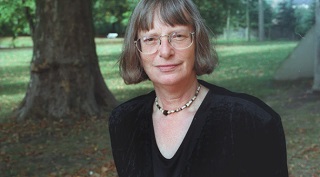
Elke Erb (Scherbach, 18 februari 1938)
De Vlaamse dichter en schrijver Gaston Burssens werd geboren in Dendermonde op 18 februari 1896. Zie ook alle tags voor Gaston Burssens op dit blog.
Merellied
Reeds is de zon in purperbrons gezonken
en sleept na zich een laan van gloed,
die ’t landschap verwt in kleurenpracht en ’t haantje
van de toren fonklen doet….
Daarna, in ’t nakend, fluistrend avondslomen,
gewiegd door ’t ruisen van het riet,
weerklinkt uit malse, volle merelborste,
het malse, volle merellied:
het gallemt in de plecht’ge avondstand;
met lieflijk stijgend geborrel,
en ’t schalt en ’t schalt en ’t zijpelt door de lucht,
met rollend, orgelend gescharrel;
en ’t wijfje galmt hem tegen, guitig-lief,
als helder tokkelende bronne.
En samen gorgelen z’een lied, een lied
van kalme, stille levenszonne….
Ontsnapping
De spijker van mijn lichaam is verroest.
De suiker opgelost in vet en water.
De spijker heb ik in mijn kist geslagen.
Mijn kist met zeep en water opgepoetst.
Dies is van mij niet méér gebleven
dan niets [maar met een majuscuul].
Of niets. Wat zit ik hier dan te beweren?
Zoiets is radicaal òf ridicuul.
Welnee. Welnee. Gezelle zei het reeds:
‘Niets is een kouse voeteloos
en zonder been d’r an’.
Wat dan?
Zo’n Niets is zo maar niets. Het is het iets
dat ons altijd nog juist ontsnappen kan.
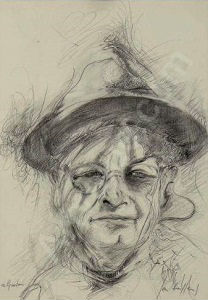
Gaston Burssens (18 februari 1896 – 29 januari 1965)
Portret door Jan Brussens, z.j.
De Duitse dichter, theoloog en predikant Johannes Theodor Rudolf Kögel werd geboren op 18 februari 1829 in Birnbaum. Zie ook alle tags voor Rudolf Kögel op dit blog.
Im Kleinsten das Größte
Der Sterne Glanz erhebt mich von der Erde,
Doch schöner träumt sich’s noch am Flackerherde.
Das weite Meer — wie hold ist seine Bläue,
Doch holder eines Menschenauges Treue.
In alle Fernen will der Mensch zerfließen,
Doch süßer ist’s, den Freund ans Herz zu schließen.
Dem Frieden, den die Himmel nicht umrahmen,
Die Treu” im Kleinen wird ihm Wiege. Amen.
Einem kranken Freunde
Der Wein erfreut des Menschen Herz.
Er ringt sich durch die arme Rebe
Aus finsterer Erde überwärts,
Daß er den Trank der Labung gebe.
Der Wein erfreut des Menschen Herz,
Wie golden glänzt die sonnige Traube!
Doch wird sie unter Not und Schmerz
Gepreßt durch harte Kelterschraube.
Der Wein erfreut des Menschen Herz.
Im dunklen Keller muß er liegen.
Die Glut in des pokales Erz
Ist aus der Gruft emporgestiegen.
Der Wein erfreut des Menschen Herz.
Du, Herr, wirst mich aus Dunkelheiten,
Nach mancher Prüfung himmelwärts,
Zum ewigen Hochzeitsmahl geleiten.
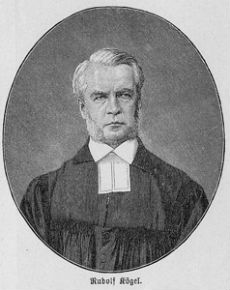
Rudolf Kögel (18 februari 1829 – 2 juli 1896)
Zie voor nog meer schrijvers van de 18e februari ook mijn blog van 18 februari 2018 deel 2.

